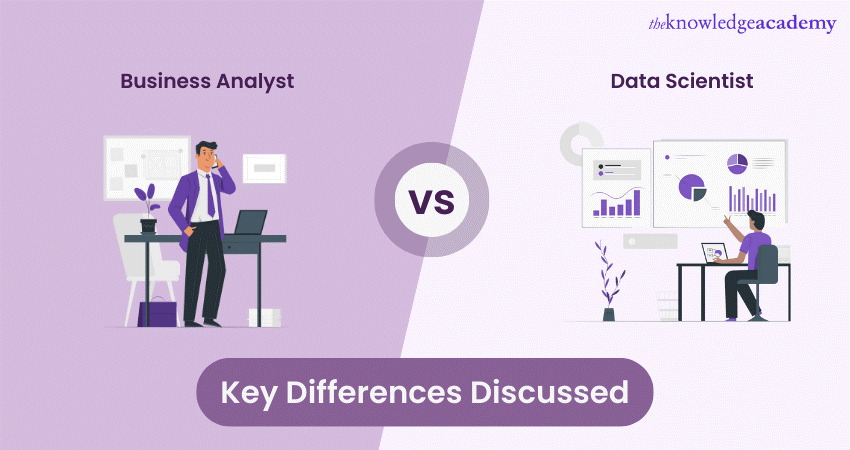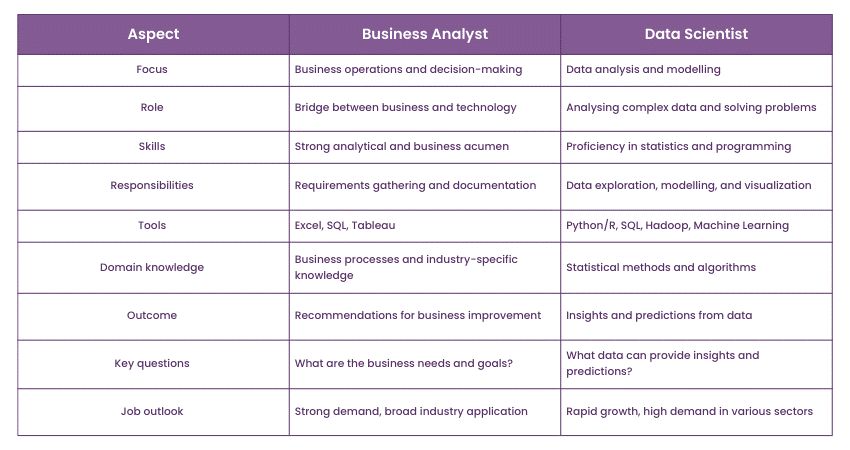We may not have the course you’re looking for. If you enquire or give us a call on + 1-866 272 8822 and speak to our training experts, we may still be able to help with your training requirements.
Training Outcomes Within Your Budget!
We ensure quality, budget-alignment, and timely delivery by our expert instructors.

The success of a modern business is strongly related to how it manages its data. As modern-day organisations continue to use data to their advantage and improve business efficiency, the demand for data scientists and business analysts has grown exponentially. The career options are closely associated, but many aspiring professionals often enquire about the key differences between Business Analyst vs Data Scientist.
According to Glassdoor, a Business Analyst in the United Kingdom earns £48,806 per annum, while a Data Scientist earns £55,354 per year. With the demand for both professions growing exponentially, more and more aspiring professionals want to be hired in either role. However, one needs to know the key differences before opting for one. Read this blog and explore insights on Business Analysts vs Data Scientists, including their unique skills, qualifications and responsibilities.
Table of Contents
1) Who is a Business Analyst?
a) Skill requirements
b) Qualifications
2) Who is a Data Scientist?
a) Skill requirements
b) Qualifications
c) Responsible
3) Difference between Data Scientist and Business Analyst
4) Top careers in Business Analysis and Data Science
5) Conclusion
Who is a Business Analyst?
Business analysis is the practice of analysing, organising, and enabling change in an organisation by identifying the needs of the organisation. It also recommends solutions that deliver value to the stakeholders.
A Business Analyst is a “change agent” who defines a roadmap related to new opportunities by analysing the data and developing actionable plans. They are also tasked with identifying discrepancies within different business models and helping decision-makers understand a business’s past and present performance and forecast the future.
Supercharge your business analysis skills by signing up for our comprehensive Business Analyst Training courses today!
Skill requirements
The following are the different skills that a Business Analyst must possess:
a) Strong communication skills
b) Comprehensive knowledge of data modelling and its methods
c) Ability to deal with clients
d) Knowledge of Microsoft Excel, SWOT, PESTLE, Trello, and BEAM
e) Strong leadership ability
Qualifications
The following are the minimum qualifications that a Business Analyst must have:
a) A technical degree, like a Master’s degree in Computer Applications or a management degree, such as an MBA or BBA from a reputed college or university.
b) Four to five years experience in a software or IT company.
c) Adequate interpersonal and organisational skills to build and influence effective product-user relationships
d) Strong communication and business analysis skills
e) Ability to manage customer expectations and work on projects independently
f) Ability to travel depending on the business requirements
g) Business Analysts are often experts in cleaning, organising, and storing data. However, this role focuses on solving business challenges and applying the relevant knowledge to the company’s financial goals.
Responsibilities
Read the following points to understand the different responsibilities of a Business Analyst:
a) Communicate with clients and look for business solutions
b) Specialise in structured data only
c) Have adequate interpersonal and management skills
d) Possess technical knowledge of SQL, Tableau, and Microsoft Excel
e) Assist in designing and implementing tech solutions
f) Track and update business projects and growth
g) Engage with users or customers and monitor buying patterns and needs
h) Ensure consistent growth in product usage
i) Use visualisation to showcase useful insights
k) Communicate the latest technologies to the team and help resolve problems
l) Lead sessions with the IT team to understand client requirements/goals
m) Provide user feedback to the product team
The responsibilities of a Business Analyst could vary significantly based on their level of experience and the industry they cater to. However, the core duties of their role will be the same: every Business Analyst will have to manage large datasets and help support company decisions by identifying key data trends.

Want to take your Business Analysis skills to the next level? Sign up for our Certified Business Analyst Professional (CBA-PRO) course today!
Who is a Data Scientist?
Data science is an interdisciplinary field involving extracting and analysing raw data to create structured data. Data Scientists are usually more involved in the front end of the data collection and analysis process.
A Data Scientist specialises in a high level of data manipulation, including writing complicated algorithms and computer programming. Since their responsibilities include designing, developing and deploying algorithms to help collect and analyse data, Data Scientists tend to develop more technical skills in these areas. While both Data Science and Business Analysis rely on basic coding and data manipulation knowledge, data science focuses more on the specialisations of Big Data, Machine Learning, and others.
Unlock the power of Data Science! Join our comprehensive Data Science Training Course today.
Skill requirements
The following are the skills that a Data Scientist must have:
a) A strong knowledge of statistics and mathematics.
b) Proficiency in tools such as Python, R, Hadoop, and Spark
c) Sufficient knowledge of SQL and NoSQL
d) A strong understanding of machine learning algorithms
e) Ability to solve real-world business issues by applying machine learning methods
f) The skill to interpret and transfer data into usable insights for business stakeholders
Qualifications
The following points present the qualifications a Data Scientist must possess:
a) More than three years experience in Data Analytics, Data Science, or a Bachelor’s degree in any field - Computer Science, Mathematics or Statistics.
b) Experience in working with machine learning models
c) Strong analytical and problem-solving skills
d) An ability to structure unstructured data
e) A level of comfort and patience while dealing with complex and conflicting data
f) Data Scientists usually require more specialised knowledge of coding and advanced data manipulation than Business Analysts. It is often the case that Business Analysts and other entry- or mid-level analysts become Data Scientists.
Responsibilities
A Data Scientist must carry out the following responsibilities:
a) Extract and organise unstructured raw data into structured data sets
b) Look for unstructured and structured data to extract meaningful insights
c) Need to have extensive knowledge of machine learning, statistics, and mathematical skills
d) Have a comprehensive understanding of Python, Spark, TensorFlow, Hadoop and R
e) Make adjustments in machine learning models
While some of the Data Scientist’s responsibilities overlap with those of a Business Analyst, they are typically asked to solve higher-level issues. On the other hand, Business Analysts are asked to focus on the challenges that could help an organisation become more profitable.
Take your Data Science skills to the next level. Sign up for our Advanced Data Science Certification course today.
Difference between Data Scientist and Business Analyst
Let’s understand the key differences between Data Scientist and Business Analyst through the below table.
|
Data Scientists |
Business Analysts |
|
They focus on using data to solve complex problems and make informed decisions. |
They analyse business needs and translate them into actions. |
|
To formulate data-driven strategies, they work alongside stakeholders to comprehend their requirements for data. |
In order to identify business opportunities, define metrics and gather requirements, they work closely with stakeholders. |
|
They use advanced statistical analysis, ML and predictive modelling to identify patterns and make predictions. |
They use Business Analysis techniques like gathering requirements, mapping processes, and visualising data to support decision-making. |
|
They analyse large volumes of data using sophisticated models and algorithms to derive actionable insights. |
Their responsibilities include creating reports, designing dashboards, and preparing presentations to effectively communicate insights and recommendations to different stakeholders. |
|
They are proficient in Python or R, as well as big data technologies for manipulation and analysis. |
They have proficiency in Excel, SQL, and data visualisation tools enables effective data analysis and presentation. |
|
They possess strong analytical, mathematical, and statistical skills to solve complex data problems and generate insights. |
They have strong business acumen, domain expertise, and communication skills to bridge technical analysis and business goals. |
Prepare Like a Pro: Explore Key Business Analyst Interview Questions Today!
Top careers in Business Analysis and Data Science
Both fields have tremendous growth potential and offer popular and rewarding career options. Both graduates and early career professionals can gain quick entry into Data Science, however to enter the field of Business Analytics, one needs to have experience in management and business development. The following are some top careers in the Business Analysis and Data Science domain:
a) Business Intelligence Analyst: As part of a subset of Business Analysis, Business Intelligence Analysts convert an organisation’s data resources into effective insights to help the business make better decisions and maximise profit. They work on the data provided by the Data Scientists and are often expected to consider it independently to help find user patterns. A Business Intelligence Analyst should have comprehensive knowledge of reporting tools and databases. According to Glassdoor, the annual salary average for a Business Intelligence Analyst is £69,178.
b) Data Scientist: They are responsible for extracting and designing new processes for data modelling, mining, and producing structured and unstructured data. They can also develop certain algorithms and custom analyses. According to Glassdoor, the annual salary average for a Data Scientist is £94,534.
c) Database Manager: They are usually tasked with recognising the problems that occur within databases. They work very closely with database developers to help provide solutions to problems and help with design. According to Glassdoor, the annual salary average for a Database Manager is £49,624.
d) Data Architect: They are trusted with complicated data sets and help design complex data frameworks or structures and maintain these databases. According to Glassdoor, the annual salary average for a Data Architect is £101,337.
Conclusion
The Business Analyst vs Data Scientist debate can be concluded by saying that though both fields are often closely associated, they have unique skills and responsibilities. While Business Analysts normally focus on findings trends in data and coming up with tech solutions to improve operations, Data Scientists focus more on understanding what drives these trends. Having said that, both Data Scientists and Business Analysts work closely with each other to recommend suitable solutions to stakeholders.
Master the fundamentals of Business Analysis and boost your career prospects by signing up for our Business Analyst Fundamentals course now!
Frequently Asked Questions
Upcoming Business Analysis Resources Batches & Dates
Date
 Certified Business Analyst Professional (CBA-PRO)
Certified Business Analyst Professional (CBA-PRO)
Thu 23rd Jan 2025
Thu 10th Apr 2025
Thu 15th May 2025
Thu 17th Jul 2025
Thu 11th Sep 2025
Thu 13th Nov 2025







 Top Rated Course
Top Rated Course



 If you wish to make any changes to your course, please
If you wish to make any changes to your course, please


